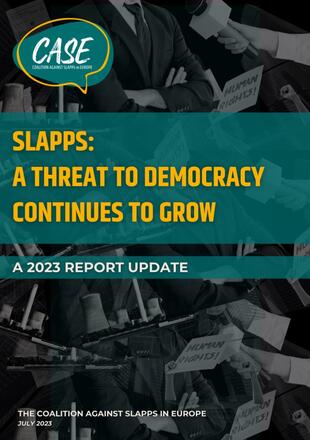
CASE 2023 report "SLAPPs: Increasingly Threatening Democracy in Europe" discusses the growing threat of SLAPPs (Strategic Lawsuits Against Public Participation) in Europe and their impact on democracy. The report follows up on CASE's 2022 report and highlights the rise of SLAPPs in Europe. It discusses the shocking findings from the previous report, and the increase in SLAPP cases year by year. The document provides insights into the rise of SLAPPs in Europe and their impact on individuals, organizations, and democracy, calling for stronger legal protections to address this issue. It does so by presenting data on the number of SLAPP lawsuits in Europe, showing a significant increase in cases filed in 2022 compared to the previous year. It highlights the growth of SLAPP cases in various European countries and discusses the geographical spread.
Key takeaways:
- Who is the SLAPP Target: The report identifies journalists as the most common targets of SLAPPs, followed by media outlets, editors, activists, and NGOs. It also emphasizes the importance of support for individual targets.
- Who is the SLAPPer: The majority of SLAPP litigants are businesses/businesspersons, followed by state-owned entities and politicians. It shows that those in positions of power are the most common plaintiffs.
- Issues Targeted: The report highlights the issues most frequently targeted by SLAPPs, including business-related issues, corruption, government, and environmental concerns.
- Damages: It discusses the value of damages claimed in SLAPP lawsuits, with some cases demanding exorbitant sums. The report also mentions the chilling effect of cost orders in some jurisdictions.
The report concludes that SLAPPs pose an increasing threat to democracy in Europe, with a growing number of vexatious lawsuits shutting down acts of public participation. It emphasizes the need for robust anti-SLAPP protection measures and legislation at both the national and international levels.
Tags: SLAPP Freedom of expression Media freedomThe content of this article can be used according to the terms of Creative Commons: Attribution-NonCommercial 4.0 International (CC BY-NC 4.0) . To do so use the the wording "this article was originally published on the Resource Centre on Media Freedom in Europe" including a direct active link to the original article page.

